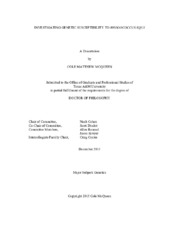Investigating Genetic Susceptibility to Rhodococcus equi
Abstract
Rhodococcus equi causes pneumonia and extrapulmonary disorders in foals and other immunocompromised animals including people. Although exposure to virulent R. equi is widespread in the environment of foals, only a small proportion of foals develop R. equi pneumonia at affected farms. It remains unclear why some foals develop disease while other exposed foals do not. Anecdotal evidence suggests there may be an underlying genetic predisposition to disease resulting from R. equi infection and the genetic contributions of the host remain ill-defined.
A genome wide association study (GWAS) examining single nucleotide polymorphisms (SNPs) and copy number variants (CNVs) to identify regions of the genome contributing to disease was performed. Although no associations were made with CNVs, a set (viz., four) of SNPs were significantly associated with R. equi pneumonia. The SNPs identified localized to a region on chromosome 26 containing a potential candidate gene. The transient receptor potential cation channel, subfamily M, group 2 (TRPM2) gene is known to play a critical role in neutrophil recruitment and the severity of tissue damage at sites of inflammation. One associated SNPs in the GWAS is located within this gene and was used, via PCR, to validate the GWAS finding in a joint analysis. Joint analysis revealed a 3- to 4-fold increase in odds of disease for individuals homozygous for the SNP identified in TRPM2. This finding was consistent across each clinical group compared.
RNA-Seq was performed to further investigate this region, as well as identify others across the genome, and understand the functional implications on gene expression that may be marked by the identified SNPs. Each TRPM2 genotype was represented (viz., AA, AB, BB) in the 12 horses that were donors for sequencing. RNA-Seq analyses identified several novel transcripts across the TRPM2 region; however, none were differentially expressed in relation to the TRPM2 genotypes. Several genes identified as being differentially expressed were linked through pathway analysis which further implicated innate immunity as being a critical player in the pathogenesis of R. equi pneumonia. Further studies are required to identify targets and practices for the control and prevention of R. equi pneumonia in foals.
Citation
McQueen, Cole M (2015). Investigating Genetic Susceptibility to Rhodococcus equi. Doctoral dissertation, Texas A & M University. Available electronically from https : / /hdl .handle .net /1969 .1 /156479.


